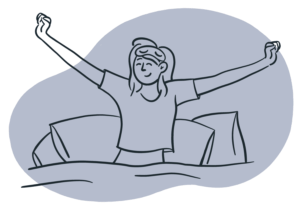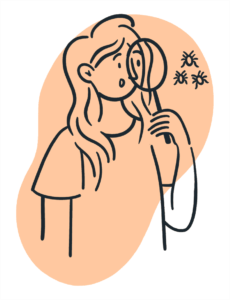Summer Sleep Guide
Disclosure: By clicking on the product links in this article, Mattress Nerd may receive a commission fee at no cost to you, the reader. Read full disclosure statement.
It’s finally summer, the time to bask in the sweltering heat of sunshine and to escape into the refreshing air conditioning inside. Temperature regulation, also referred to as thermoregulation, is of the utmost importance in summer, and we pay dearly for it. According to the Energy Information Administration, the average price per kilowatt-hour (kWh—the unit of measurement for electricity) for residential properties in the United States has been increasing for the past couple decades and in 2020, reached an all time high.
Thermoregulation has a lot to do with our comfort not only when we’re active and awake, but also when we’re asleep. That’s because throughout the day, and the night, our body temperature fluctuates. A bedroom that’s too hot or too cold can sabotage your sleep.
Keeping comfortable when you sleep, especially in the summertime, requires more than turning the thermostat down a few notches. It helps to better understand how temperature and humidity impact the quality of sleep.
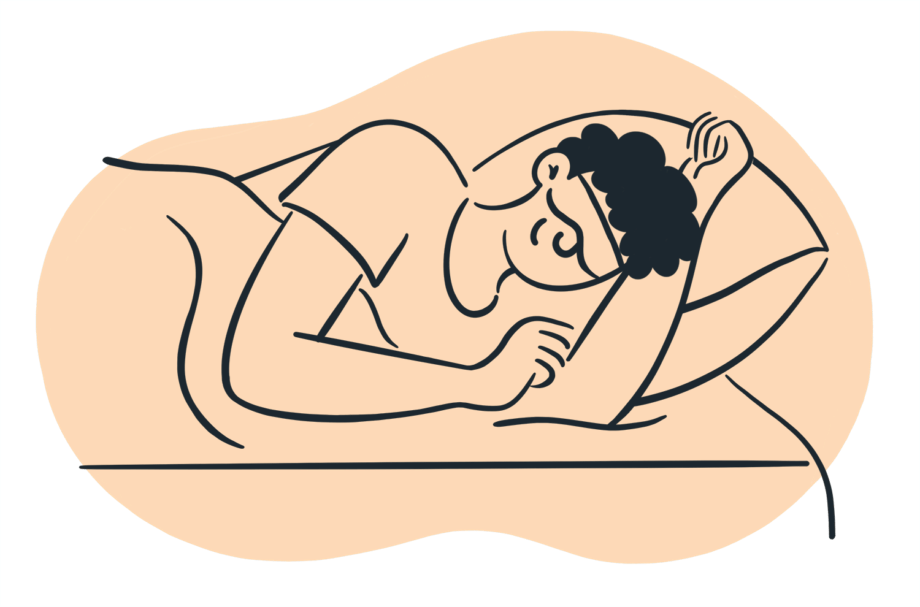
How Are Temperature and Sleep Related?
The body is a wondrous thing. It’s equipped with an internal 24-hour clock, known as the circadian rhythm, that tells your body when to get sleepy at night and when to wake up in the morning. When it senses that bedtime is near, the circadian rhythm triggers the release of hormones like melatonin that cause your core body temperature to fall by releasing heat through the peripheral parts of the body. Hours later, when the body senses morning is near, the circadian clock signals body temperature to rise to prepare you to wake up.
When you drift off to sleep at night, your core body temperature drops about 1 to 2 degrees from your waking temperature, while your peripheral skin temperature rises. (Normal peripheral temperature is generally accepted to be 98.6 degrees though normal temperature can range from 97 degrees to 99 degrees.)
Research has shown that the temperature of the environment you’re sleeping in can also impact your body’s thermoregulation process. Doctors recommend setting your thermostat to between 60 and 67 degrees. However, that range can fluctuate based on factors such as age and gender.
Finding the right temperature setting for your sleep environment is important. If you become too hot or too cold while sleeping, it disturbs restorative slow wave sleep and results in less REM sleep. That’s because during REM sleep, the body’s temperature regulation becomes impaired, which is why the body “avoids” REM sleep when it is too hot or too cold.
But there’s more to comfort than what the thermostat reads.
How are Humidity and Sleep Related?
Humidity is a measure of how much water vapor is in their air. If there is a lot of water vapor in the air, the humidity is high. The higher the humidity, the wetter and stickier you’ll feel. When humidity is high, the air is full of so much water vapor that it can feel impossible to dry off because the water vapor on your skin (or sweat, in hotter temperatures) isn’t able to evaporate into the air. When humidity levels rise above 70 percent, you can expect to feel uncomfortable.
If your bedroom is too humid, you are more apt to sweat during the night and wake to damp sheets. Too much humidity can also encourage dust mites and the growth of mold, which can aggravate allergies.
Conversely, low humidity is when very little water vapor is in the air. When humidity is low, you may experience dry skin, sore throat, irritated sinuses, and itchy eyes. You may also notice you get zapped by static electricity more often. That’s because with less water vapor in the air to conduct this charge away from you, your body can carry a higher charge. When humidity levels fall lower than 25 percent, you can also expect to feel uncomfortable.
If your bedroom is too dry, it could flare sinus symptoms and you can experience nosebleeds. Low humidity can also dry out your skin, which can make you itch and disrupt your sleep.
The humidity sweet spot for sleeping is between 30 to 45 percent. You can lower the humidity in your bedroom with a dehumidifier. Or, you can increase the humidity by using a humidifier.
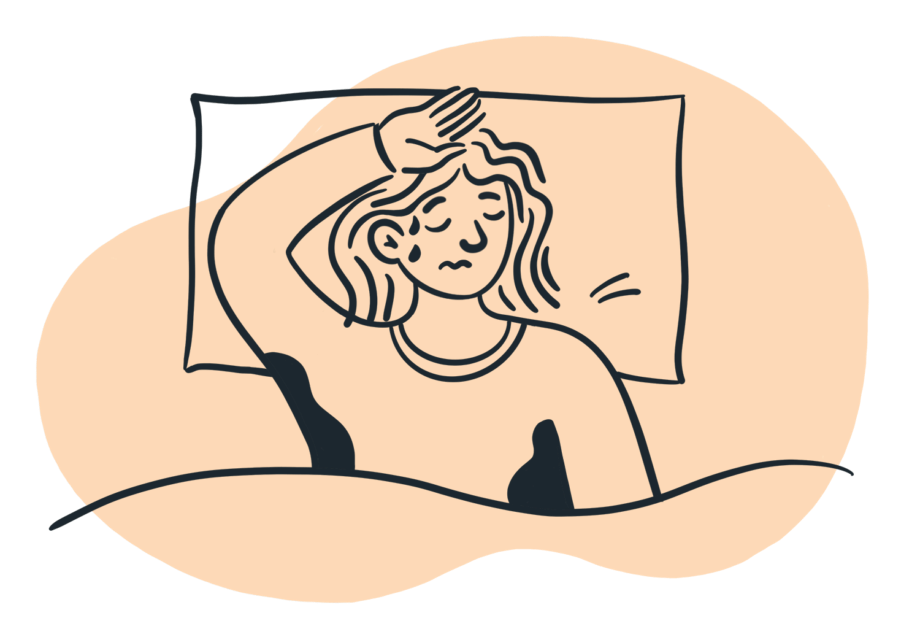
Tips for Sleeping Cool and Keeping the Energy Bill Low
We asked experts to offer some sleep hygiene tips for sleeping more comfortably without burning too much electricity.
Lifestyle Suggestions
- Exercise is a great way to burn excess energy so you sleep better. But if you do it too close to bedtime it can wreck your sleep. First, exercise causes your body to release endorphins, the so-called “feel good” hormones, which make you feel energized. Exercise also causes your body temperature to rise. Exercise early enough in the day to allow a couple hours afterwards for the endorphins to flush out of your system and your body temperature to return to normal.
- Take a cozy hot bath or shower before bed. “It seems counterintuitive, but take a hot shower before going to bed,” says Dr. Chelsie Rohrscheib, head sleep specialist and neuroscientist at Tatch, a consumer electronic device that monitors sleep. “When you exit the shower, the water on your skin rapidly evaporates, cooling your body’s core quickly. This sharp drop in temperature not only cools your body but also signals to your brain that it’s time to sleep, allowing you to get deeper, high-quality sleep despite the heat. For best results, allow yourself to air dry.” Another benefit of a hot bath is that it also helps calm your muscles for a relaxing night’s sleep.
- Cut back on alcohol before bedtime. Alcohol is a depressant, so it can lull you to sleep — sometimes before you plan to go to bed. But too much alcohol too close to bedtime can reduce restorative deep sleep and REM sleep, and even cause you to sweat during the night. As a result, you can wake feeling soggy, groggy, and possibly hungover.
- Keep a glass of ice-cold water on your bedside table, Rohrscheib says. Not only will it quench thirst, it’ll help cool you down. Be sure to use a coaster as the condensation on your glass could create a ring on your table.
- Consider your pajamas. If you choose to wear something other than your birthday suit to bed, “Use breathable, high-quality cotton pajamas to allow better airflow,” Rohrscheib says. Another sustainable option are pajamas made with bamboo. “Investing in high-quality pajamas is a must to stay cool, she adds. “Synthetic materials tend to trap heat and don’t absorb sweat very well.”
- Eat smaller portioned dinners. Heavy meals packed with carbs or fats take longer to digest and increase your body temperature. Spicy foods, in particular, can cause you to sweat. “Sleep with a flexible gel ice pack binding your neck,” Rohrscheib says. “Not only will this cool your head but it will also trick your brain into thinking the rest of your body is cool.” Another option is to “fill a sock with rice, tie it at the end and put it in the freezer during the day. Then use it as a cold compress to keep you cool at night without spending any money,” says Jennifer Sizeland, a writer and eco-friendly blogger at LandofSize.com.
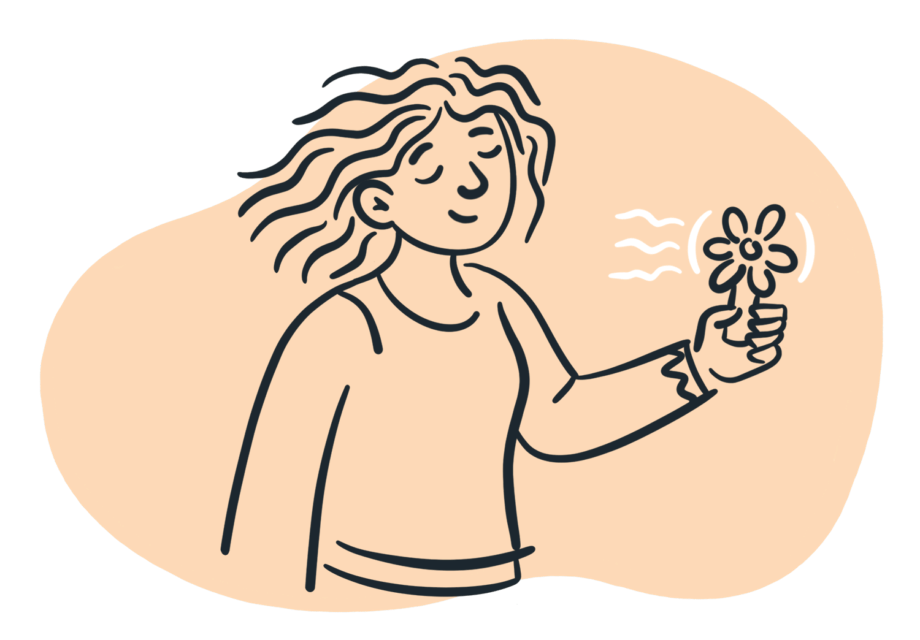
Bedroom Suggestions
- Pull the shades. Keeping sunlight out of your room will help keep the hot summer sun from warming your space during the day and will keep temperatures down during the night. Black out curtains are especially helpful for blocking heat, and during cold winter months, insulating your room. For additional shade, consider adding plants to your exterior window sill or an awning above your window.
- Invest in a new mattress. Some mattresses are specifically designed to keep you cool including cooling gel-infused or charcoal-infused memory foam or aerated latex foam.
- Try new bed clothes. “To stay cool at night, look for sheets, pillows, and mattress toppers that include cooling features,” says Gabriel Dungan, founder and CEO of ViscoSoft. “Look for sheets and pillows with moisture wicking and cooling fabrics to help regulate your temperature while you sleep.” Fabrics to look for include moisture-wicking cotton, linen, or bamboo as opposed to ones made with synthetic fibers.
- Add a cooling mattress topper. “Consider investing in a cooling pad for your bed. There are several different kinds of cooling pads available, including pads that contain gels that direct heat away from your body while you sleep. In the last few years, newer technology, including electric cooling pads that maintain temperature throughout the night are available, although they are usually more expensive,” Rohrscheib says.
- Turn the thermostat down. Sleep experts recommend lowering your thermostat to about 60 to 67 degrees. However, depending on your age, gender, or personal preferences, you may sleep more comfortably with the thermostat set slightly higher or lower. Test out different temperatures each night until you find the perfect one.
- Keep air circulating with a ceiling fan or box fan. Or, better yet, “Ice packs can also be tied to a regular fan to blow colder air if it is an especially hot night,” Sizeland says. This can help mitigate the effects of high humidity and will be kinder to your electricity bill as well.
- Chill your pillowcases. Put your pillow cases in the fridge then slide them onto your pillows right before bed. This will help keep you cool as you drift off to sleep.
- Seal drafty windows. “One of the best ways to stay cool on hot nights without being environmentally irresponsible is to make sure any drafty windows have been sealed,” says Chris Riley, CEO of prescription discount service USA Rx. “This will prevent heat from getting in while keeping the cold air inside. This means that your AC won’t have to work as hard to keep your house cool. It also seals in heat in the winter, making your furnace bill go down as well.”
- Humidify or dehumidify. Sleep will be lousy if your sleeping environment is too humid or dry. Remedy the situation with a dehumidifier or humidifier placed directly in your bedroom.
Final Thoughts
Our bodies run like well-oiled machines. As bedtime approaches, our core temperature drops by releasing body heat through peripheral parts of the body. Our bodies crave cooler temperatures and less humidity at night for optimal sleep. If your sleep is suffering, chances are your bedroom may be too hot or cold, or too humid or dry.
Don’t spend another sleepless night tossing and turning. Try some of the pointers mentioned above for a dreamier summer’s night sleep.
